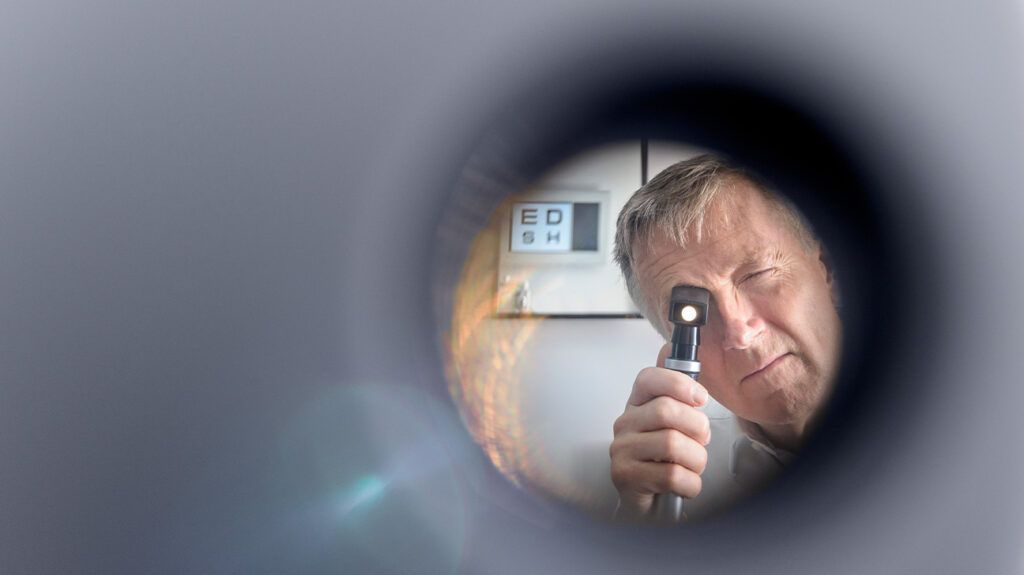Without treatment, glaucoma can cause irreversible, progressive vision loss and blindness. The progression rate may depend on the type of glaucoma someone has.
Glaucoma is a progressive condition that occurs when pressure builds up in the eye. There is no cure for glaucoma, but treatment can help people manage the symptoms and avoid further complications.
Increasing eye pressure can lead to irreversible damage to the optic nerve without treatment.
This article explains what happens if a person does not receive treatment for glaucoma, its progression rate, treatment options, and when to contact a doctor.

The most common type of glaucoma is open-angle glaucoma (OAG). In this type, the eye does not drain fluid effectively, causing a buildup of pressure. Over time, the pressure can damage the optic nerve.
Closed-angle glaucoma (CAG) occurs less often. In this type of glaucoma, the iris of the eye is close to the drainage angle, through which eye fluid drains. The iris may block the drainage angle and cause a rapid buildup of eye pressure.
Both types of glaucoma involve damage to the optic nerve, which can lead to vision loss and blindness.
Around
As the condition progresses, it may affect their central vision, which a person requires for daily tasks such as driving and reading.
Glaucoma is especially prevalent in older adults. In 2020, the condition accounted for
Treatment cannot reverse damage to the optic nerve due to glaucoma. However, according to a 2023 overview article on glaucoma, it
Over time, the condition can cause severe vision impairment and even blindness. Early diagnosis and treatment may help significantly minimize damage to the optic nerve, and vision loss.
Learn about open-vs. closed-angle glaucoma.
OAG typically progresses gradually and may not cause vision loss for
However, any vision loss that occurs is irreversible, so treating slow progression can still be beneficial.
CAG can also develop gradually and without noticeable symptoms, which may mean that people do not realize they have glaucoma until the damage is severe. CAG can result in sudden attacks of acute glaucoma.
An attack of acute glaucoma is a medical emergency and can result in permanent and irreversible vision loss within
Learn more about acute angle-closure glaucoma.
A person
Treatment for glaucoma can differ depending on the type and severity of the condition. Available options may include:
- Medicated eye drops: A doctor may prescribe medicated eye drops to help reduce eye pressure. These may help treat glaucoma by helping fluid flow through the drainage angle more effectively or reducing fluid production in the eye.
- Laser surgery: Laser surgery can help drain fluid from the eye to reduce pressure. Types include trabeculoplasty, which improves the drainage angle in people with OAG, and iridotomy, which creates a small hole in the iris for fluid drainage in people with CAG.
- Surgery: Some types of surgery for glaucoma occur in an operating room. This may include fitting drainage devices, cataract surgery to improve the drainage channel, and trabeculectomy, which creates a tiny flap in the sclera.
Learn more about treatment options for glaucoma.
Early diagnosis and treatment can significantly reduce a person’s risk of further vision loss and blindness. If a person experiences any signs or symptoms of glaucoma, they should contact a doctor. These can include:
- blurred vision
- changes in peripheral vision
- blind spots
If a person experiences acute glaucoma symptoms, they
- intense eye pain
- seeing rainbow-colored haloes around lights
- redness in the eye
- blurred vision
- a headache
- nausea and vomiting
Learn about the different types of eye doctors and what they do.
Risk factors
A person should attend regular eye exams even if they do not have symptoms of glaucoma or other eye problems. Individuals can also request a comprehensive dilated eye exam to help doctors diagnose glaucoma early.
People with a higher risk of glaucoma than the larger population can contact a doctor to request a glaucoma test. High risk groups
- people with a family history of glaucoma
- people with diabetes
- African American people ages 40 and older
- all people ages 60 years and older
Learn about tests for glaucoma.
Below are the answers to some frequently asked questions about glaucoma.
What is the life expectancy of a person with glaucoma?
Researchers
What causes glaucoma to worsen?
Various medications can increase eye pressure and worsen glaucoma, including steroids and many cold and flu medications that contain decongestants and antihistamines.
People with glaucoma should speak with a healthcare professional to determine which medications they should avoid depending on their type of glaucoma.
Can someone live with glaucoma without going blind?
Only a
Glaucoma is a condition in which pressure in the eye damages the optic nerve. Without treatment, it can progress to more severe vision loss and blindness.
There is no cure for glaucoma, but treatment can help slow its progression and prevent further complications.
Early diagnosis and treatment can minimize damage to the optic nerve. A person can lower the risk of vision loss from glaucoma by attending regular eye exams. Individuals who experience symptoms of glaucoma should contact a doctor.
Eye health resources
Visit our dedicated hub for more research-backed information and in-depth resources on eye health.
